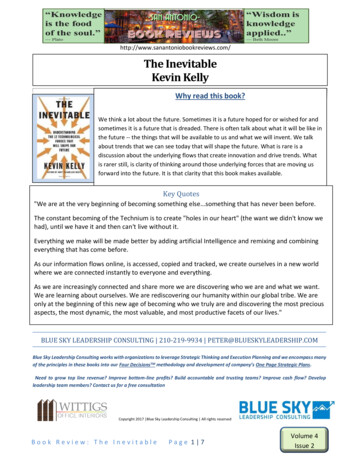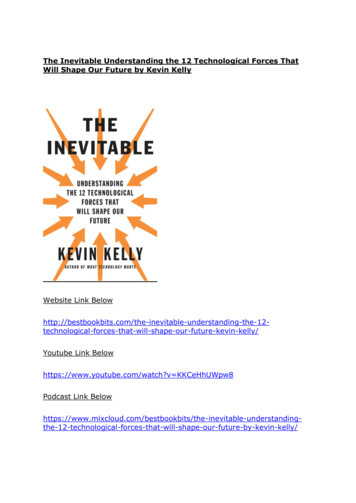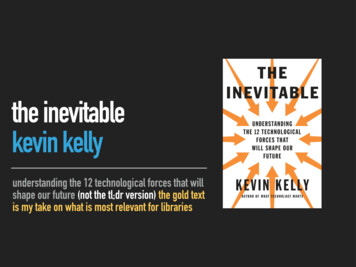
Transcription
Ep #132: The Inevitable with Kevin KellyFull Episode TranscriptWith Your HostThe Brainfluence Podcast with Roger Dooley
Ep #132: The Inevitable with Kevin KellyWelcome to the Brainfluence Podcast with Roger Dooley, author, speakerand educator on neuromarketing and the psychology of persuasion. Everyweek, we talk with thought leaders that will help you improve your influencewith factual evidence and concrete research. Introducing your host, RogerDooley.RogerDooley:Welcome to the Brainfluence Podcast, I'm Roger Dooley.My guest this week has multiple claims to fame. For one, heco-founded Wired in nineteen ninety-three and is still on themasthead as Senior Maverick. Even before that, he helpedlaunch The Well, a pioneering online community. He's abest-selling author, having written New Rules for the NewEconomy, among other books and his newest book,published just a few months ago is, The Inevitable:Understanding the Twelve Technological Forces that willShape our Future. Perhaps the coolest thing though, is thathis personal domain is a mere two letters long, kk.org.Welcome to the show, Kevin Kelly.Kevin Kelly:Hey, it's my pleasure. Thanks for having me.RogerDooley:Great. Kevin, is there a story behind that domain? Did yousnag that in the very early days of domain registration ormanage to grab it later?Kevin Kelly:No, it wasn't early enough because, if I was really smart, Iwould have been kk.com. It was still in the mid-nineties, so Ipaid for it. It was a doctor in Hong Kong who wasn't using itand I bought it from him. I remember and I was working at atime when anybody could have claimed any domain namethey wanted for free. There wasn't etiquette at the time,which it was considered ill form, kind of impolite, to actuallyThe Brainfluence Podcast with Roger Dooley
Ep #132: The Inevitable with Kevin Kellybuy, not buy, but to claim a URL that you weren't using. Thething was, you could get whatever you wanted, but youactually had to then put it up and put it on a server and get itgoing. You couldn't just hold them. I had friends who weren'tplaying by the rules and as that started to break up, theystarted to register all kinds of names that they could think of.I wasn't that smart. I kept thinking, there's no way thesethings are going to become valuable. We're going to have tohave multiple . Domains will be dot everything and, ofcourse, I was wrong.RogerDooley:Well, yeah. If you talk to folks that go back to the early daysof domain registration, the one regret everybody has is thatthey failed to register cars.com or many of the otherdomains that now are worth millions each. Be that as it may,kk.org still is pretty nice.Kevin, I'm sure many of our listeners are Wired readers.Wired is closing in on twenty-five years now, how does apublication like that stay relevant, particularly, in an areathat's changing so quickly and so often?Kevin Kelly:It's a really good question. Full disclosure, I do not editWired Magazine these days. I don't work for them. Icontinue to have a title, which means I do one big piece ayear for them at freelance rates, so to speak. I have to saythat I don't think I really would want to edit Wired these daysbecause it's really, really hard to be relevant. When we weredoing Wired before it was sold out from under us, we wererunning a pirate ship and now, after twenty-five years, Wiredis more like a flagship. That's a very different sensibility andThe Brainfluence Podcast with Roger Dooley
Ep #132: The Inevitable with Kevin KellyI'm much more likely to want to keep over turning the tablesand reading the assumptions and tweaking the conventionalwisdom. Whereas, I think Wired today, is a little bit morelike, "We're the authorities. We give the [inaudible]. This iswhat's important." That's what I see as this role in this kindof seething news and a lot of stuff from the digital world,which is percolating, almost unstoppably, through our lives. Ithink Wired is much more in a kind of, sorting things out andtrying to say, "Here's this really important. Look at this." Ithink it's role as, sort of, a herald from a distant subculture, adistant future, is gone and everybody is trying to report onthe future now. It's a much more competitive landscape.RogerDooley:Really, since its start, technology has become part ofeveryday life for everybody, where back in the earliest days,a lot of folks really didn't have much of a brush withtechnology, at least, as far as having it in their pocket or allover their home.Kevin Kelly:Yeah. Technology is a very squishy word. We tend to use itto mean, anything that was invented after we were born,when in fact, of course, it's everything and most of thetechnology surrounding us is very old stuff. From concreteto wood lumber, even to things like sheet rock and plumbingand all that. That's most of it, which we don't see astechnology anymore. It's just completely invisible to us.Technology today, of course, will become invisibletomorrow. It was this digital stuff that was coming that wethought was really important. It was this domain of nerdy,pimply guys, teenagers in the basement and we keptsaying, "This is bigger than that." My own experience ofbeing online since nineteen eighty-one or so, is that, no, thisThe Brainfluence Podcast with Roger Dooley
Ep #132: The Inevitable with Kevin Kellyis real stuff, there's real communities, there's real thingshappening. It's not about teenagers and CB radio, it's big,it's going to touch all aspects of our lives. That's what wewere trying to educate people saying, "What's happeninghere is fundamental shift in the culture and it's going to bemainstream." That was something that we repeated many,many times and it was just really hard for people to believe.RogerDooley:Well, it was a good call twenty plus years ago, so I think,maybe, that gives some credibility to your prognosticationsin this book too, Kevin.Before we leave Wired, I have one quick question,recognizing that you're not necessarily running the showanymore, but do you think the graphic designers there goout of their way to make some stuff hard to read? Like,reverse white type on a silver background? Occasionally, Ijust find myself flummoxed, where I've got to hold themagazine at a good angle just to read the content.Kevin Kelly:You are so right. It infuriates me. It's not just the currentregime. Even in the early days of Wired, I constantly waslosing battles with the designers saying, "Hey, how aboutsome radical legibility. How about that?" Something whereit's so easy to read. We would sweat over these articles for. Just killing ourselves and then, they'd be published andnobody could read them because of the design. It's like, thisis not in anybody's favor. I have a long going gripe with theillegibility of some of the Wired articles, including currentlytoday, where they bump up the column of text against animage. It's like .The Brainfluence Podcast with Roger Dooley
Ep #132: The Inevitable with Kevin KellyRogerDooley:Yes, I've noticed that, where there's no spacing at all.Kevin Kelly:Why are you doing that? Why are you making it hard? I losethese battles all the time, what can I say.RogerDooley:I have a theory, Kevin. There's research on cognitivefluency that shows, when something is hard to read, it mayseem more difficult of profound, so perhaps that's whatthey're going for.Kevin Kelly:Yeah, I don't buy it. That's one thing I would definitelychange if I was back there, but I'm not, and so . By theway, you can always read it online, which is pretty legible,the version online. I don't think the paper version of anymagazines have more than five years in them, so this maycome a moot point, although, they may figure out how to .RogerDooley:How to transfer that to digital or .Kevin Kelly:Exactly, how to wreck reading online too.RogerDooley:Something to look forward to.Kevin Kelly:Yes.The Brainfluence Podcast with Roger Dooley
Ep #132: The Inevitable with Kevin KellyRogerDooley:Let's talk a little bit about your new book. Kevin, you say thattechnology isn't leading us to utopia or dystopia, which areprobably the two most common forecasts, but protopia.What the heck is that?Kevin Kelly:Everybody knows that utopia is a, sort of, final state, theomega point of the world was at war, perfect harmony, totalenlightenment, this sort of dream state, heavenly state.Dystopia, of course, is the opposite and it's this place whereeverything is breaking down, the future is a world ofdysfunction. That, actually, is almost the standardHollywood and current science fiction view. I cannot think ofa single science fiction movie that describes a future that Iwant to live in.RogerDooley:Perfection is kind of boring, really, compared to humanspitted against killer robots and so on.Kevin Kelly:Right. We have dystopias and we have some utopias, butnobody believes them and I don't believe them either, I thinkthey're impossible. What we do have and where we aregoing, where we have been going is, progress. Actually, realprogress so that every year, the world is a little, tiny bitbetter than last year. That tiny, whatever it is, it's onepercent, half percent, difference. When it's compoundedannually, as you know, this is one of the most powerfulforces in the world, so we have civilization by compoundinga tiny, tiny, delta of betterment every year. Sometimes,because it's so tiny, half of a percent difference, it seemsinvisible to us, but it's going on and that slow creep toThe Brainfluence Podcast with Roger Dooley
Ep #132: The Inevitable with Kevin Kellybetterment is what I call protopia. From progress, the senseof forward motion. It's basically saying that there isprogress, the progress is real. Almost every metric thatmatters to humans, life is getting better, but not by much,each year, but it's slowly creeping better and better. Thatslow betterment is protopia. It's possible.It's very possible that after two hundred years of steadyprogress, that next year it could stop, it could collapse.That's possible, but unlikely. My optimism in the future isbased in history. It's based on the fact that, for two hundredyears we've had protopia. We've had progress. We havemade the world a little tiny bit better than the previous yearand so, it's probable that, that will continue, at least, the nexttwenty or thirty years. That's where I get my optimism from.RogerDooley:That's good. That is an optimistic outlook, I think. It'sprobably a lot more plausible than utopia.Kevin, we aren't going to have time to cover all of yourtwelve forces, but the first one you talk about is, cognifying,which has to do with artificial intelligence and applying it,sometimes, to things that aren't necessarily obviouscandidates for an AI intervention. Talk a little bit about whatyou see happening in that field.Kevin Kelly:I use the word cognifying, which is sort of an obscureEnglish word to mean, although the way I'm using it is, tomake things smarter. I want to get away . There's a lot ofbaggage, a lot of cultural baggage with the idea of artificialThe Brainfluence Podcast with Roger Dooley
Ep #132: The Inevitable with Kevin Kellyintelligence because we, kind of, all have in our mind whatwe think that is and we often confuse it with lots of otherthings. We think of a very human like intelligence, but it'sartificial. What I want to emphasize is that, the AI's that weactually will be making, these artificial smartness things,these [inaudible], are in the most part, not like humans at all.In fact, that's why we're making them. The reason why wewant an AI to drive our cars is because they aren't going todrive like us. They aren't human like, they aren't beingdistracted, they don't have conscious ruminations,daydreaming and stuff, they're just going to really focus ondriving. So far, the evidence is that they are much, muchbetter drivers. Even though there's been one or twofatalities, they're still, compared to the millions of milesthey've driven, they're nowhere near as murderous ashuman drivers. Humans, last year, killed . Human driverskilled one million people and we just somehow accept that,but we should outlaw human drivers. We're just terribledrivers.The reason why we want a lot of the artificial intelligences isbecause they think differently. Because, it's a different kindof thinking and thinking differently, is actually the engine ofinnovation and wealth creation and much of what we desirein this new economy, is thinking different. We are going to,basically, invent hundreds of different kinds of minds,artificial minds. Many of them that we have invented, like acalculator, are already smarter than us in certain things likearithmetic or spacial navigation or recall. They're alreadysmarter than humans, but the point is that our ownintelligence is not a single dimensions. It's not like it's justIQ, which gets louder from a mouse to a chimp to an idiot toa regular person to a genius. Our intelligence is veryThe Brainfluence Podcast with Roger Dooley
Ep #132: The Inevitable with Kevin Kellycomplicated, we have dozens of different types of thinking inour minds and some of those types of thinking can beexceed my machines. That mix of things cannot be made bysilicon and we're not even going to try. We're going to makewhole new types of thinking that haven't existed before, justas, we made new types of flying inspired by biology andflapping wings, but we made artificial flying which doesn'tuse flapping wings at all. It's new. We are going to make upnew types of thinking to accomplish or to solve problemsthat we cannot solve with human intelligence alone.One thing I just want to emphasize is that, these things thatwe will be working with, don't think like humans. They canexceed human capabilities in many dimensions, but not allof them. You can't optimize everything that's engineer .Dictum engineering truism, which is that you can't optimizeall things. We'll make these, optimizing different things andwe will work with them. We are
Ep #132: The Inevitable with Kevin Kelly The Brainfluence Podcast with Roger Dooley Roger Dooley: Yes, I've noticed that, where there's no spacing at all. Kevin Kelly: Why are you doing that? Why are you making it hard? I lose these battles all the time, what can I say. Roger Dooley: I have a theory, Kevin. There's research on cognitive











